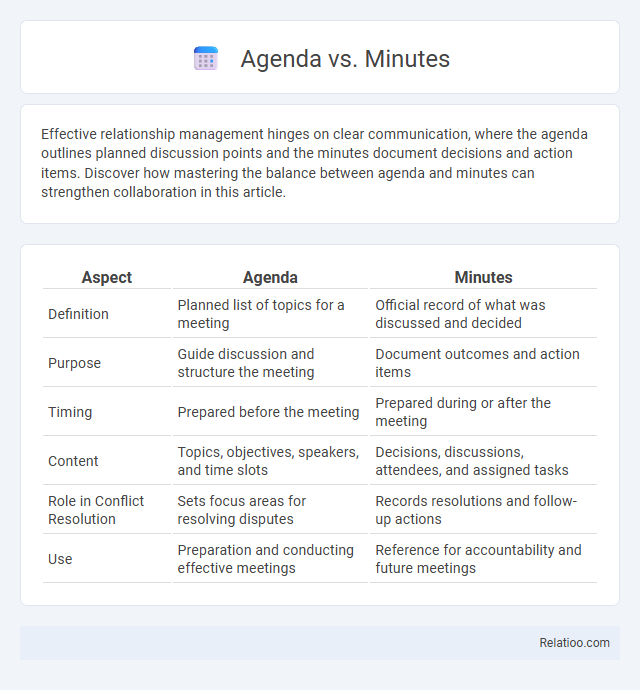Effective relationship management hinges on clear communication, where the agenda outlines planned discussion points and the minutes document decisions and action items. Discover how mastering the balance between agenda and minutes can strengthen collaboration in this article.
Table of Comparison
| Aspect | Agenda | Minutes |
|---|---|---|
| Definition | Planned list of topics for a meeting | Official record of what was discussed and decided |
| Purpose | Guide discussion and structure the meeting | Document outcomes and action items |
| Timing | Prepared before the meeting | Prepared during or after the meeting |
| Content | Topics, objectives, speakers, and time slots | Decisions, discussions, attendees, and assigned tasks |
| Role in Conflict Resolution | Sets focus areas for resolving disputes | Records resolutions and follow-up actions |
| Use | Preparation and conducting effective meetings | Reference for accountability and future meetings |
Understanding the Difference: Agenda vs Minutes
Understanding the difference between agenda and minutes is essential for effective meeting management. An agenda outlines the planned topics and objectives for a meeting, serving as a roadmap for discussions, while minutes provide a detailed record of what was discussed, decisions made, and actions assigned during the meeting. By clearly distinguishing these documents, you can enhance communication, accountability, and follow-up within your organization.
Definition of Meeting Agenda
A meeting agenda is a structured outline detailing topics, objectives, and time allocations designed to guide a meeting's flow efficiently. It ensures participants stay focused and informed about discussion points, helping Your team prepare and contribute effectively. Meeting minutes, by contrast, are the documented record of what transpired during the meeting, while an agenda sets the plan before the meeting begins.
Definition of Meeting Minutes
Meeting minutes are the official, written record of a meeting's discussions, decisions, and assigned actions, capturing essential details such as attendees, key points, and deadlines. Unlike the agenda, which outlines the planned topics for discussion, minutes document what actually transpired during the meeting. Your accurate meeting minutes ensure accountability and provide a reliable reference for future actions and follow-ups.
Key Components of an Agenda
An agenda outlines the key components of a meeting, including the topics to be discussed, the sequence of discussion, and the allocated time for each item. It serves as a roadmap to ensure efficient time management and focused discussions, contrasting with minutes which document the actual proceedings and decisions made during the meeting. Clear agenda components enhance meeting productivity by setting expectations and guiding participant preparation.
Essential Elements of Meeting Minutes
Meeting minutes serve as the official record of discussions, decisions, and action items during a meeting, capturing essential elements such as date, time, attendees, agenda topics, key points discussed, motions made, and assigned responsibilities. Unlike the agenda that outlines planned topics and the structure before the meeting, minutes focus on documenting outcomes and agreements for accountability and future reference. Precise and concise minutes ensure clarity in communication and provide a reliable reference to track progress on decisions and tasks.
Purpose and Importance of an Agenda
An agenda serves as a structured outline that guides the flow of a meeting, ensuring all essential topics are addressed efficiently and time is managed effectively. It provides clarity on the meeting's objectives, helping participants prepare in advance and stay focused on key issues. Unlike minutes, which record what transpired, the agenda plays a critical role in setting expectations and driving productive discussions.
Purpose and Importance of Minutes
Minutes serve as the official record of a meeting's discussions, decisions, and action items, ensuring accountability and transparency within an organization. Unlike the agenda, which outlines the planned topics and structure of the meeting, minutes capture the actual outcomes and commitments made during the session. Your careful documentation of minutes supports future reference, legal compliance, and effective communication among stakeholders.
How to Prepare an Effective Agenda
Creating an effective agenda involves clearly defining the meeting objectives, listing key discussion topics in logical order, and allocating specific time slots for each item to keep the session focused and productive. Your agenda should include participant roles and any pre-meeting preparation required to ensure everyone is prepared and aligned. This structured approach distinguishes the agenda from minutes, which record decisions and action items after the meeting concludes.
Best Practices for Writing Accurate Minutes
Accurate minutes capture essential decisions, actions, and discussions from meetings, serving as a reliable record for future reference. Your minutes should clearly reflect the agenda topics to maintain structure and relevance, ensuring consistency and ease of review. Best practices include concise language, precise time stamps, attendee lists, and objective summaries to enhance clarity and accountability.
Comparing Agenda and Minutes: Key Takeaways
An agenda outlines the planned topics and structure for a meeting, serving as a roadmap to keep discussions focused and efficient. Minutes are detailed records of what transpired during the meeting, capturing decisions, actions, and key points for future reference. Understanding the distinction between your meeting agenda and minutes ensures effective preparation and accurate documentation for actionable follow-up.

Infographic: Agenda vs Minutes
 relatioo.com
relatioo.com